formerly eScholarship Editions


|
|
|
|
Your search for
'Musicology' in subject
found 26 book(s). | Modify Search | Displaying 21 - 26 of 26 book(s) | |
| 21. | 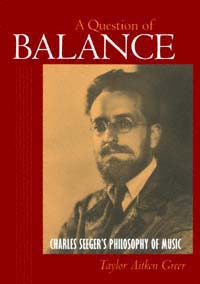 | Title: A question of balance: Charles Seeger's philosophy of music Author: Greer, Taylor Aitken 1955- Published: University of California Press, 1998 Subjects: Music | Ethnomusicology | Musicology | Composers Publisher's Description: One of this century's most influential musical intellects takes center stage in Taylor Greer's meticulously wrought study of Charles Seeger (1886-1979). Seeger left an indelible mark in the fields of musicology, music criticism, ethnomusicology, and avant-garde musical composition, but until now there has been no extended appreciation and critique of Seeger's work as a whole, nor has an accessible guide to his texts been available.Exploring the entire corpus of Charles Seeger's writing, A Question of Balance highlights the work of those persons who most influenced him, especially Henri Bergson, Bertrand Russell, and Ralph Perry. Invited to inaugurate the music department at the University of California's Berkeley campus in 1912, Seeger became keenly aware of his deficiencies in general education and put himself on a rigorous regimen of intellectual development that included studying history, anthropology, political theory, and philosophy. For the remainder of his life his ideas about music heavily influenced the development of ethnomusicology and systematic musicology.Charles Seeger is perhaps best known as the father of the folk singers Pete, Mike, and Peggy Seeger and as the husband of the innovative American composer Ruth Crawford. This book makes clear that Seeger was an extremely important thinker and educator in his own right. Seeger's intellectual curiosity was as eclectic as it was enthusiastic, and Greer skillfully weaves together the connections Seeger made between music, the humanities, and the sciences. The result is a luminous tapestry depicting Seeger's ideal schemes of musicology. At the same time it reflects the turbulence and vitality in American musical life during the early decades of the century. [brief] Similar Items |
| 22. | 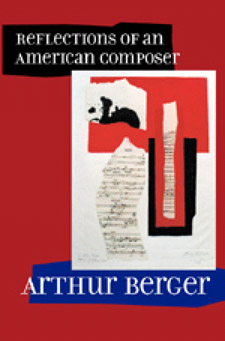 | Title: Reflections of an American composer Author: Berger, Arthur 1912- Published: University of California Press, 2002 Subjects: Music | American Music | Classical Music | Contemporary Music | Composers | Musicology Publisher's Description: In this engrossing collection of essays, distinguished composer, theorist, journalist, and educator Arthur Berger invites us into the vibrant and ever-changing American music scene that has been his home for most of the twentieth century. Witty, urbane, and always entertaining, Berger describes the music scene in New York and Boston since the 1930s, discussing the heady days when he was a member of a tight-knit circle of avant-garde young composers mentored by Aaron Copland as well as his participation in a group at Harvard University dedicated to Stravinsky. As Virgil Thomson's associate on the New York Herald Tribune and founding editor of the prestigious Perspectives of New Music, Berger became one of the preeminent observers and critics of American music. His reflections on the role of music in contemporary life, his journalism career, and how changes in academia influence the composition and teaching of music offer a unique perspective informed by Berger's abundant intelligence and experience. [brief] Similar Items |
| 23. | 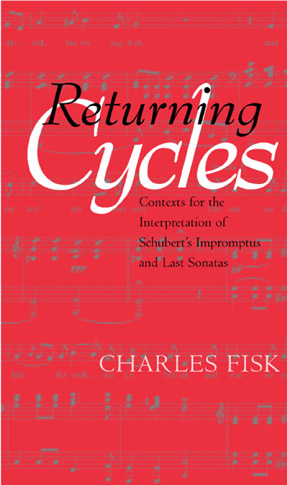 | Title: Returning cycles: contexts for the interpretation of Schubert's impromptus and last sonatas Author: Fisk, Charles Published: University of California Press, 2001 Subjects: Music | Musicology | Composers Publisher's Description: This compelling investigation of the later music of Franz Schubert explores the rich terrain of Schubert's impromptus and last piano sonatas. Drawing on the relationships between these pieces and Schubert's Winterreise song cycle, his earlier "Der Wanderer," the closely related "Unfinished" Symphony, and his story of exile and homecoming, "My Dream," Charles Fisk explains how Schubert's view of his own life may well have shaped his music in the years shortly before his death. Fisk's intimate portrayal of Schubert is based on evidence from the composer's own hand, both verbal (song texts and his written words) and musical (vocal and instrumental). Noting extraordinary aspects of tonality, structure, and gestural content, Fisk argues that through his music Schubert sought to alleviate his apparent sense of exile and his anticipation of early death. Fisk supports this view through close analyses of the cyclic connections within and between the works he explores, finding in them complex musical narratives that attempt to come to terms with mortality, alienation, hope, and desire. Fisk's knowledge of Schubert's life and music, together with his astute and imaginative attention to musical detail, helps him achieve one of the most difficult goals in music criticism: to capture and verbalize the human content of instrumental music. [brief] Similar Items |
| 24. | 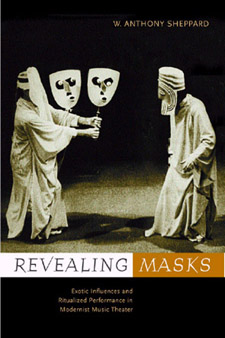 | Title: Revealing masks: exotic influences and ritualized performance in modernist music theater Author: Sheppard, William Anthony 1969- Published: University of California Press, 2001 Subjects: Music | American Music | Contemporary Music | Ethnomusicology | Opera | Musicology | Intellectual History Publisher's Description: W. Anthony Sheppard considers a wide-ranging constellation of important musical works in this fascinating exploration of ritualized performance in twentieth-century music. Revealing Masks uncovers the range of political, didactic, and aesthetic intents that inspired the creators of modernist music theater. Sheppard is especially interested in the use of the "exotic" in techniques of masking and stylization, identifying Japanese Noh, medieval Christian drama, and ancient Greek theater as the most prominent exotic models for the creation of "total theater." Drawing on an extraordinarily diverse - and in some instances, little-known - range of music theater pieces, Sheppard cites the work of Igor Stravinsky, Benjamin Britten, Arthur Honegger, Peter Maxwell Davies, Harry Partch, and Leonard Bernstein, as well as Andrew Lloyd Webber and Madonna. Artists in literature, theater, and dance - such as William Butler Yeats, Paul Claudel, Bertolt Brecht, Isadora Duncan, Ida Rubenstein, and Edward Gordon Craig--also play a significant role in this study. Sheppard poses challenging questions that will interest readers beyond those in the field of music scholarship. For example, what is the effect on the audience and the performers of depersonalizing ritual elements? Does borrowing from foreign cultures inevitably amount to a kind of predatory appropriation? Revealing Masks shows that compositional concerns and cultural themes manifested in music theater are central to the history of twentieth-century Euro-American music, drama, and dance. [brief] Similar Items |
| 25. | 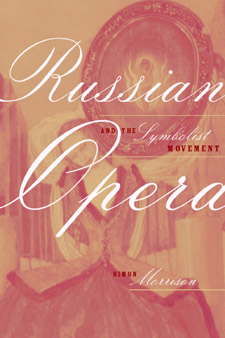 | Title: Russian opera and the symbolist movement Author: Morrison, Simon Alexander 1964- Published: University of California Press, 2002 Subjects: Music | Opera | Musicology | Composers | Russian and Eastern European Studies | Literature Publisher's Description: An aesthetic, historical, and theoretical study of four scores, Russian Opera and the Symbolist Movement is a groundbreaking and imaginative treatment of the important yet neglected topic of Russian opera in the Silver Age. Spanning the gap between the supernatural Russian music of the nineteenth century and the compositions of Prokofiev and Stravinsky, this exceptionally insightful and well-researched book explores how Russian symbolist poets interpreted opera and prompted operatic innovation. Simon Morrison shows how these works, though stylistically and technically different, reveal the extent to which the operatic representation of the miraculous can be translated into its enactment. Morrison treats these largely unstudied pieces by canonical composers: Tchaikovsky's Queen of Spades, Rimsky-Korsakov's Legend of the Invisible City of Kitezh and the Maiden Fevroniya, Scriabin's unfinished Mysterium, and Prokofiev's Fiery Angel. The chapters, revisionist studies of these composers and scores, address separate aspects of Symbolist poetics, discussing such topics as literary and musical decadence, pagan-Christian syncretism, theurgy, and life creation, or the portrayal of art in life. The appendix offers the first complete English-language translation of Scriabin's libretto for the Preparatory Act. Providing valuable insight into both the Symbolist enterprise and Russian musicology, this book casts new light on opera's evolving, ambiguous place in fin de siècle culture. [brief] Similar Items |
| 26. | 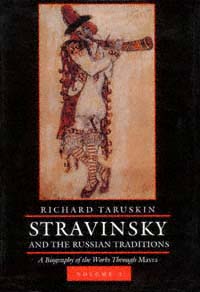 | Title: Stravinsky and the Russian traditions: a biography of the works through Mavra Author: Taruskin, Richard Published: University of California Press, 1996 Subjects: Music | Musicology | Russian and Eastern European Studies Publisher's Description: This book undoes 50 years of mythmaking about Stravinsky's life in music.During his spectacular career, Igor Stravinsky underplayed his Russian past in favor of a European cosmopolitanism. Richard Taruskin has refused to take the composer at his word. In this long-awaited study, he defines Stravinsky's relationship to the musical and artistic traditions of his native land and gives us a dramatically new picture of one of the major figures in the history of music.Taruskin draws directly on newly accessible archives and on a wealth of Russian documents. In Volume One, he sets the historical scene: the St. Petersburg musical press, the arts journals, and the writings of anthropologists, folklorists, philosophers, and poets. Volume Two addresses the masterpieces of Stravinsky's early maturity - Petrushka, The Rite of Spring, and Les Noces . Taruskin investigates the composer's collaborations with Diaghilev to illuminate the relationship between folklore and modernity. He elucidates the Silver Age ideal of "neonationalism" - the professional appropriation of motifs and style characteristics from folk art - and how Stravinsky realized this ideal in his music.Taruskin demonstrates how Stravinsky achieved his modernist technique by combining what was most characteristically Russian in his musical training with stylistic elements abstracted from Russian folklore. The stylistic synthesis thus achieved formed Stravinsky as a composer for life, whatever the aesthetic allegiances he later professed.Written with Taruskin's characteristic mixture of in-depth research and stylistic verve, this book will be mandatory reading for all those seriously interested in the life and work of Stravinsky. [brief] Similar Items |